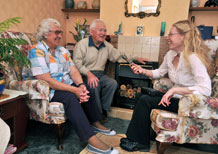
Vera Jones with her brother-in-law Steve Jones being interviewed by Dr Kayleigh Milden.
Truro’s unknown history to be exposed
Five well known housing estates in Truro are about to have their history explored in a new project involving interviews with local people who have lived on the estates.
Unlike past records of history which documented the landed gentry and major industrialists, this will focus on the lives of ordinary people. The aim of this oral history project is to find out more about how people conducted their lives, work, education and how they spent their leisure time over the last 50 years.
Residents both past and present from Malabar, Rosedale, Trelander, Malpas and Tregurra housing estates are being encouraged to share their stories. Experts from the University of Exeter’s History department on the Cornwall Campus, are working in partnership with Truro City Council and the Truro Historical Project to develop the community scheme which aims to explore what things were like and how they have changed and developed since World War Two on the housing estates.
Dr Kayleigh Milden from the University of Exeter has already recorded several interviews with residents in their homes and is excited by the range of responses, she said: ‘the story of Truro’s housing estates has almost been forgotten within the city’s history. This is a fantastic opportunity for us to tell the story of the estates through the residents’ words, which is the true ethos behind oral history: celebrating ‘hidden histories’ through the peoples’ voice. This is also an important project nationally, as it provides a valuable insight into the experiences of the generation of people who made up the first communities on the new council estates constructed after the Second World War.’
She added, ‘A good example of this was a fascinating interview with Vera Jones and her brother-in-law, Steve Jones, who live on the Malpas Estate. Vera has lived in the same house on the estate since 1951. She remembers when she first stepped into her new home she thought it was “a palace”; a stark contrast to the tiny cottage where she lived before.’
In the recorded interview with Dr Milden, Vera also recalled the strong sense of community that existed on the estate in its early years: “Well it was wonderful. We were all around the same age, we all had children around the same age; we were what you might call part of the ‘baby boom’ after the war. You made friends so quickly and so easily”.
Interviews are being conducted on the estates throughout the summer months and into the autumn by Dr Milden working with Dr Mandy Morris. In 2010 the project will culminate in a touring exhibition and website of a history and heritage previously undocumented.
Trudy Swan, a Community Development Worker from Truro City Council, who has worked in setting up resident associations and community centres in the area, said of the project: ‘It’s great that the Truro oral history project will build on the work with the local residents. This professional approach to documenting shared personal memories helps to make the area of heritage and history more accessible and interesting. It can also help create a sense of ownership of our personal heritage and its importance across the county.’
The Arts and Humanities Research Council ploughed £105k into the project and a substantial amount of partnership funding has been received from the Truro Community Development Partnership.
The Truro Oral History Project is keen to hear from anyone from any of the five housing estates who would like to be part of the audio project. Contact Kayleigh Milden, Trudy Swan and Mandy Morris on (01872) 245500 or email: oralhistory@truro.gov.uk
Date: 7 August 2009
